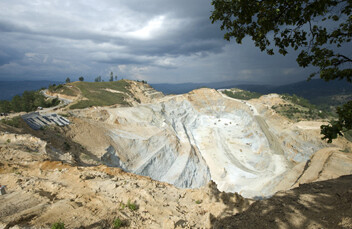September 11, 2011 will mark Guatemala's fourth democratic presidential election since the signing of the 1996 Peace Accords brought an end to decades of civil war and military rule. Leading in national polls is Otto Pérez Molina, a former general who headed the military during the early 1980s, a time stained by mass human rights violations and violence against indigenous groups.
One issue that has not received a fair hearing this electoral cycle is mining. Mining has been present in Guatemala since the colonial period, but it has done little to boost the national economy. Today the sector is expanding rapidly—exacerbating political corruption, marginalizing indigenous populations, and threatening the environment.
Guatemala has recently allotted significant mineral concessions to multinational corporations as it looks to foreign markets as a way to build revenue. Since 2010 alone, the Guatemalan government has granted 144 licenses for exploration and four exploitation licenses. These expansive licensing measures have significantly increased mining's share of the national economy. It is still relatively small compared to the other sectors, yet mining could be considered the highest risk.
Under current President Alvaro Colom, little has been done to shield citizens from the negative impacts of mineral extraction. Substantial revenues have been brought into the country, but Guatemala is still rife with corruption, poverty, low levels of education, and high rates of malnutrition. With $2,790 GNI per capita, most Guatemalan citizens have yet to see benefits from this extractive sector.
In the run-up to the election, the civil society group CALAS invited nine candidates to discuss their positions on mining. Only one showed up.
Subsequently, Yuri Melini, executive director of CALAS and moderator of the mining discussion, has received anonymous death threats in the mail. While the origin of the threats remains unknown, international humanitarian organizations such as Oxfam America are calling on the Guatemalan government to address this grave development.
Guatemala's Notorious Marlin Mine
Canadian mining corporation Goldcorp focuses on gold and silver extraction in the Americas and manages current operations at Marlin, a controversial mining project located in the hills of San Marcos, an area home to Mayan indigenous groups. Since opening in 2005, the open-pit mine has been cited for severe environmental contamination, community tensions, and human rights violations. An independent environmental study was released last year by E-Tech International, an environmental research organization, citing concerns about ground and surface water contamination, including high levels of arsenic and sulfate. Community members have submitted countless complaints to their local government with little to no response.
During its first year of operation, community members set up a blockade on the access road in an attempt to disrupt the supply chain. One person was killed and sixteen others were injured in the protest. Over the years, extractive-sector activists have received death threats and suffered beatings, kidnappings, and assassination attempts. Some of the more vocal activists require 24-hour protection for their safety.
The international community has taken notice. Last summer, the International Labor Organization, Inter-American Commission on Human Rights, and the UN Committee on Elimination of Racial Discrimination (CERD) all recommended that operations at the Marlin Mine be suspended until the environmental damages and human rights concerns were addressed. The government responded positively in June 2010, noting that it would begin the process of suspending the mine.
One year later, little progress has been made and the mine continues to operate, exacerbating local frustrations. In response to this lack of movement, members of the United States Congress submitted a bipartisan letter to the Guatemalan government in March 2011, asking that the administration take appropriate steps to adhere to the recommendations.
Conflict around mineral operations is not new to Guatemala. In 1965, Inco Exmibal mine deployed an army to forcibly remove community members from a concession area, sparking an uprising in the surrounding community. The government responded in force with a pacification campaign that included targeted killing of opposition voices and supporters. With one of the highest murder rates in Latin America, it's no surprise that there is blatant mistrust of the government's ability to maintain control of the rural regions.
Incidents like these are not only catastrophic for local residents, but can be particularly damaging to corporate reputations, a factor closely linked with investor confidence.
Promising Policies
The International Finance Corporation (IFC), the private lending arm of the World Bank, revised its Sustainability Framework this past May, and it now includes Free Prior and Informed Consent (FPIC). FPIC is a dynamic process to ensure that those affected by commercial operations are given timely and accurate information and proper avenues to approve or reject a project prior to its onset. The IFC, as financier of many extractive projects in developing countries, holds a considerable leadership role in the industry. Other lending groups, export credit agencies, governments, and private sector stakeholders look to the IFC's Performance Standards when setting their own internal practices.
With indigenous groups often exhibiting disproportionate rates of poverty and marginalization from mainstream society, it is crucial that international policies reflect their need for increased protections. Indigenous communities represent 40 percent of the Guatemalan population and should be considered a significant stakeholder in the country. Community members affected by the Marlin Mine operation, which was formerly financed by the IFC, could have benefitted significantly from the Sustainability Framework had it been implemented before the project was initiated.
Just last month, not one month into office, Peruvian President Ollanta Humala passed the Indigenous Peoples Consultation Law, making community consultation mandatory. The next Guatemalan president should take note.
Risky Moves
Like many developing countries, Guatemala is deep in debt to international financial institutions such as the World Bank. With a debt of $1.4 billion to the Bank, the government is in a precarious position in its engagement with large multinational corporations. While Guatemala's debt-to-GDP ratio is the lowest in the region, it still faces a heavy burden. Advocating against a company like Goldcorp for its gross violation of international law could decrease Guatemala's revenue flows, risk a possible lawsuit from the corporation. and infringe upon the tight restrictions of the Central America Free Trade Agreement (CAFTA).
The government of El Salvador is currently in a legal battle over CAFTA with another Canadian mining corporation, Pacific Rim. In 2009, El Salvador denied Pacific Rim an environmental permit, which resulted in a $77 million lawsuit. In the wake of that case, the government has declared a moratorium on mining in response to the environmental and social threats posed by the operation—a bold move for a developing country.
Take Note, Mr. or Ms. President
When the Guatemalan people go to the polls on September 11 to choose their next president, it is critical that they—along with the diaspora population, the United States, and the international community—stand in support of a presidency that will hold mining companies accountable to the highest standards of practice and international law, ensuring that they implement strong environmental safeguards and consult and receive consent from indigenous communities.
For a young democracy in such a sensitive political space, strong natural resource management is essential. As the death threats surrounding the absentee presidential mining debate indicate, the politics of mining in Guatemala has created a risky environment for human rights advocates.
If the next president of Guatemala wants to gain legitimacy in the international arena, he or she must seriously evaluate the mining sector to ensure that it is producing a positive net benefit for all the Guatemalan people, and hold multinational corporations accountable for their operational impact.
Kathryn M. Martorana is campaign coordinator for Oxfam America's Oil, Gas and Mining Program, and a member of the Carnegie New Leaders. The views expressed in this article are those of the author and not necessarily those of Oxfam America.




